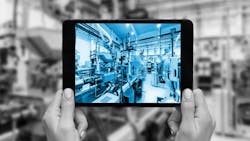How Digital Transformation Solves Three Big Manufacturing Business Problems
If you’re like a lot of manufacturers, you probably struggle with visibility into your operations. Likely, there’s a lot of manual work that goes into collecting data, sharing information across your plant (or plants), and giving the right people access to the timely data they need to make decisions.
Paper documented processes and reports shuffle around to different people or you may track things in Excel, but real-time information is rarely housed digitally in one place at any given time. That’s probably because you’re using different systems for different purposes. Maybe you’re using a finance or accounting system (often ERP) that has no connectivity or connection to shop floor production systems (SCADA, MES).
The problem grows exponentially with each additional location. People are forced to be “collectors” rather than strategic problem solvers, and manufacturing infrastructure support becomes a bottleneck to the real focus of the business: the actual manufacturing itself.
Digitally transforming your business with a modern ERP solution must have pragmatic applications or else it’s just money thrown out the door. Digitizing your production processes is more about running an efficient business than it is about jumping onto the next technology bandwagon. Here’s why: it solves these three major problems you face right now.
- Lack of Visibility or Control on the Shop Floor
Manufacturing starts on the shop floor. This is where material moves, product is created, and where the work gets done. You must have shop floor control, including access to production information, inventory, quality data, and the ability to quickly adjust to machine status across the enterprise. This is very difficult when information is not housed and transmitted digitally, and when processes and documentation are conducted manually.
- Disconnected Machines, People, and Processes
The shop floor must connect to the rest of your enterprise to make key data accessible and promote rapid, accurate decision-making. Beyond the shop floor, your business should provide connectivity to your suppliers and your customers. And your employees should have instant access as appropriate to the data they need.
Digital transformation supported by cloud ERP addresses both problems. By automating paper-based, manual processes, and consolidating information into one database, a single set of accurate data is accessible as needed by the users (and, increasingly, machines) that need it. A cloud ERP system that supports both ERP and manufacturing execution system (MES) functionality consolidates disparate capabilities onto a single connected platform, with the production visibility and control you need to run a competitive and viable business.
- Bogged Down People and Resources
Cloud ERP automates production communication and processes freeing up your resources so your people can focus on problem solving instead of managing legacy baggage. Technical people who spend most of their time managing IT infrastructure and software systems can pivot to business analysis. Production workers gain instant access over any device to production details instead of having to hunt down and piece together information. Managers can view, at a moment’s notice, analytics that relate to their role from anywhere, over any device, to stay on top of business.
Cloud ERP is a critical step toward digital transformation in manufacturing. Going paperless, automating processes, and adding granular visibility all give you a seismic shift in the way your business is conducted—while laying the foundation for you to leverage future innovations in technology.
For more insights, watch the on-demand webinar 3 Keys to Digital Transformation in Manufacturing.
